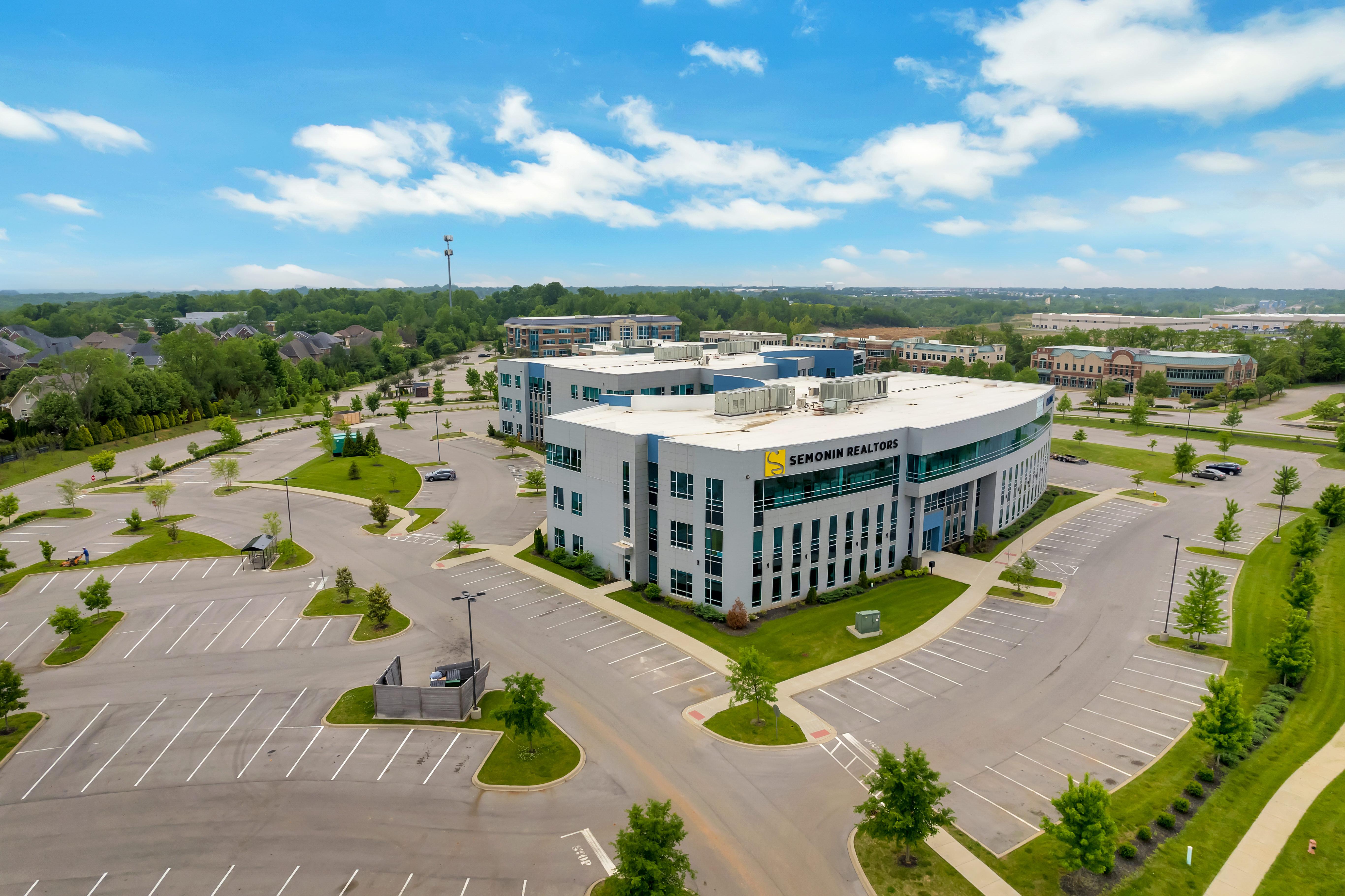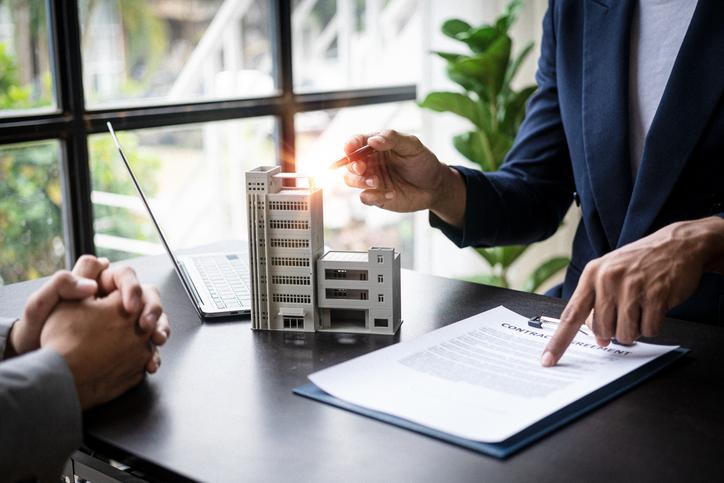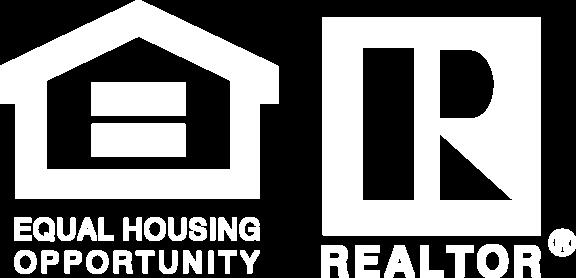

ABOUT SEMONIN REALTORS®
With a legacy spanning over a century, Semonin REALTORS® has solidified its position as a trusted cornerstone of the Louisville and Southern Indiana communities since 1915.
Semonin’s Commercial Division expertise encompasses a diverse range of transactions, from acquisitions to dispositions to leasing arrangements. We excel in various property types, including vacant land, multi-family dwellings, retail spaces, offices, and industrial properties.
Leveraging the robust resources of Semonin, our agents possess the acumen to streamline transactions, deliver market insights, optimize negotiation outcomes, and provide unwavering professional support. Our commitment is to navigate every facet of the process, ensuring the highest probability of a successful and advantageous transaction for our clients.
SEMONIN'S HISTORY
Since 1915, when Paul Semonin, Sr. opened his real estate office in Louisville, service has been the defining characteristic of Semonin REALTORS®. Right from the outset, the company earned a reputation for its unwavering commitment to honesty and integrity when serving its customers—a legacy that remains strong today. When Paul Semonin, Jr. assumed leadership in the 1940s, he made sure to reinforce the company’s dedication to service, extending it not only to their clients but also to the real estate profession as a whole.
Paul Semonin, Jr.’s outstanding commitment and leadership were recognized, leading to his election as the president of the Louisville Board of REALTORS®, followed by prominent positions as president of the Kentucky Association of REALTORS® and director of the National Association of REALTORS®.
At present, President Stacy Durbin, continues the tradition of guiding the company to provide exceptional service to customers, the community, and the real estate profession. Now, more than a century later, Semonin REALTORS® stands as the largest and most respected real estate company in this region, primarily because of its associates’ unwavering dedication to service.
As a company, Semonin REALTORS® is continually striving to discover better serve its customers, always seeking and enhance their real estate experiences. ongoing commitment to service cornerstone of the company’s reputation in the industry.
Whether you’re buying, selling conducting a 1031 Exchange or commercial real estate, count Commercial Division for the expertise to make every transaction

Stacy Durbin President

OUR COMMITMENT TO YOU
•
•
•
•
•
•
•
•
Tailored Solutions: Our approach is tailored to meet your unique needs, ensuring that every aspect of the transaction aligns with your goals and preferences.
Transparent Communication: We believe in open and transparent communication, keeping you informed and involved at every step of the process.
Timely Response: Your time is valuable, and we prioritize prompt responses to your inquiries and concerns, ensuring a smooth and efficient experience.
Integrity and Ethics: We conduct our business with the highest standards of integrity and ethics, earning your trust through honesty, fairness, and professionalism.
Strategic Guidance: With our in-depth market knowledge and strategic insights, we guide you through complex decisions, helping you make informed choices that drive success.
Advocacy: As your advocate in the market, we tirelessly represent your interests, negotiating fiercely on your behalf to achieve the best possible outcomes.
Continued Support: Our commitment doesn't end at the closing table. We remain available to offer ongoing support and assistance, building a lasting relationship beyond the transaction.
• Dedicated Support: We are committed to providing personalized attention and support throughout every stage of your commercial real estate journey.
Results-Oriented Approach: We are results-driven, focused on delivering tangible results that exceed your expectations and contribute to your long-term success.
TOP REASONS TO CHOOSE SEMONIN
WE ARE THE LONGEST STANDING LEADER IN OUR MARKET
1
Being ranked as the #1 real estate company for decades, Semonin is the region's most influential real estate brokerage across Kentuckiana. Our name is reputable and we are known for our integrity and excellence.
WE ARE THE LARGEST BROKERAGE IN THE AREA
2
With over 400 agents, Semonin has the largest and most respected sales force with associates who are trained to proactively bring buyers to you rather than waiting for prospects to find your property. This allows agents to leverage our in-house network of hundreds of associates, staff, and core service professionals to attend to every detail of the transaction.
STRONG, LOCAL BRAND RECOGNITION
3
Given our 100+ year history and longevity as a market leader, the Semonin name has become synonymous with Kentuckiana real estate. People know our brand stands for excellence and they can trust that Semonin will serve their real estate needs, whatever they may be with professionalism and class.
4
EXPERTISE AND KNOWLEDGE
By staying up-to-date on market and industry trends, both locally and nationally, the knowledge of Semonin agents can help buyers and sellers make informed decisions and negotiate favorable deals Semonin is known for relentlessly educating their agents This equips them to be the best in the business when it comes to navigating complex transactions, avoiding potential pitfalls, and closing deals.
SEMONIN'S STAFF IS THE BEST IN THE BUSINESS
5
Semonin's well-rounded team consists of more than 40 skilled staff members, including legal counsel, IT specialists, seasoned sales managers, administrative support, and a comprehensive marketing department This unique setup provides our agents and their clients an unrivaled advantage and ensures the smoothest transactions
ABOUT OUR SERVICES

MULTI-FAMILY


RETAIL


Semonin's commercial expertise spans across all types of transactions, encompassing purchases, sales, and leases. As specialists in multi-family, retail, office, land, and industrial properties, we guarantee a perfect match for your commercial real estate requirements.
Having a strong and consistent marketplace presence provides buyers with unparalleled access to the best opportunities. With extensive client databases and deep industry connections, our agents can quickly identify and secure properties that meet your specific needs. Their established reputation and market knowledge ensure you receive expert guidance and strategic insights, making the buying process efficient and successful.
OFFICE SPACE
INDUSTRIAL
VACANT LAND
BENEFITS OF OWNING COMMERCIAL PROPERTY
Investing in commercial real estate offers a range of advantages that can make it a highly rewarding venture for buyers. From generating substantial income to providing significant tax benefits, commercial property ownership presents opportunities for long-term wealth building and financial stability. Unlike residential properties, commercial properties come with unique benefits that cater to the needs of businesses and investors alike. Let's explore four key benefits of owning commercial property, highlighting why it can be a smart and lucrative addition to your investment portfolio.
INCOME POTENTIAL
Rental Income: Commercial properties can generate substantial rental income, often yielding higher returns compared to residential properties. With longer lease terms, commercial properties provide stable and predictable cash flow.
Appreciation: Over time, commercial real estate tends to appreciate in value. This long-term growth potential can significantly increase the owner's equity and overall investment value.
TAX ADVANTAGES
Depreciation: Owners can deduct the depreciation of their commercial property over time, reducing taxable income and resulting in significant tax savings.
Tax Deductions: Expenses related to maintaining and operating the property, such as mortgage interest, property management fees, and repairs, can often be deducted from taxable income.

BENEFITS OF OWNING COMMERCIAL PROPERTY

CONTROL AND FLEXIBILITY
Property Customization: Owners have the ability to modify and improve the property to attract high-quality tenants or meet specific business needs.
Leasing Terms: Owners can negotiate lease terms that are favorable to their financial goals, including rent increases, lease duration, and tenant responsibilities.
WEALTH BUILDING
Equity Buildup: With each mortgage payment, owners build equity in the property, which can be leveraged for future investments or provide financial security.
Diversification: Investing in commercial real estate diversifies an investor's portfolio, reducing risk and providing a hedge against stock market volatility.
ASSESSING YOUR NEEDS
When embarking on the journey to purchase commercial real estate, one of the most crucial steps is to thoroughly understand your needs and budget. This foundational aspect ensures that your investment aligns with your business goals and financial capabilities. Here’s a detailed guide to help you navigate this important process:
DEFINE YOUR PURPOSE
Business Use: Determine if the property will be used for your own business operations. Consider the specific requirements such as location, size, layout, and facilities needed to support your business activities.
Investment: If the primary goal is investment, identify the type of commercial property that fits your strategy, whether it’s office space, retail, industrial, or multifamily units. Evaluate the potential for rental income, appreciation, and tenant demand.
SPACE REQUIREMENTS
Current and Future Needs: Consider not only your current space requirements but also future growth plans. Ensure the property can accommodate expansion or modifications as your business evolves.
Layout and Features: Identify the essential features and layout specifications, such as open floor plans, private offices, loading docks, or parking facilities, that are critical for your operations or tenant needs.
LOCATION CONSIDERATIONS
Accessibility: Ensure the property is easily accessible for clients, customers, employees, and suppliers. Proximity to major transportation routes, public transit, and amenities can enhance the property’s appeal.
Demographics and Market Trends: Analyze the local market trends and demographics to ensure the location aligns with your target audience and business goals. High foot traffic and visibility are essential for retail properties, while proximity to industrial hubs is crucial for warehouse and manufacturing facilities.
ESTABLISHING YOUR BUDGET

FINANCIAL ASSESSMENT
Capital Availability: Assess the capital you have available for the down payment and initial costs. This includes not just the purchase price, but also closing costs, legal fees, and initial renovations or improvements.
Financing Options: Explore various financing options such as commercial mortgages, SBA loans, or private financing. Understand the terms, interest rates, and repayment schedules to determine what fits your financial situation best.
OPERATING COSTS
Monthly Expenses: Calculate the ongoing monthly expenses, including mortgage payments, property taxes, insurance, utilities, and maintenance costs. Ensure these expenses fit within your operating budget without straining your cash flow.
Unexpected Costs: Set aside a contingency fund for unexpected repairs, vacancies, or other unforeseen expenses that may arise during ownership.
RETURN ON INVESTMENT (ROI)
Income Projections: If the property is an investment, project the potential rental income and compare it against your expenses to estimate your net operating income (NOI) and overall return on investment.
Long-Term Value: Consider the potential for property appreciation over time. Analyze historical data and market forecasts to understand the long-term value growth prospects.
ASSEMBLE YOUR TEAM

Assembling the right team is crucial when buying commercial property. Each expert brings specialized knowledge and experience, ensuring every aspect of the transaction is meticulously handled. A skilled real estate agent guides you through property selection and negotiations, while a real estate attorney safeguards your legal interests. Financial advisors and accountants provide insights into investment potential and tax implications. Additionally, inspectors and contractors play a vital role in assessing the property's condition and managing any necessary renovations, preventing costly surprises down the line. Engaging these professionals early in the process can save you time and money, while also providing peace of mind. By assembling a team of these seasoned professionals, you can mitigate risks, streamline the buying process, and make informed decisions that contribute to a successful and profitable investment.
FINANCIAL PREPARATION

Financial preparation is a critical step in the commercial property buying process, as it lays the foundation for a successful and sustainable investment. Start by obtaining pre-approval for financing from a bank or lender. This step not only clarifies your budget but also demonstrates to sellers that you are a serious and qualified buyer, giving you an edge in negotiations. Pre-approval provides a clear picture of how much capital you can access, allowing you to focus on properties within your financial reach.
Next, explore various funding options to determine the best fit for your specific needs. Depending on your financial situation and investment goals, you may consider traditional loans, mortgages, or even partnerships. Each option has its advantages and trade-offs, so it’s essential to compare interest rates, repayment terms, and potential risks. For instance, a partnership might allow you to pool resources and share the financial burden, but it also requires careful consideration of partnership agreements and shared decision-making.
•
•
COMMERCIAL FINANCING OPTIONS

TRADITIONAL BANK LOANS
Characteristics: These loans typically offer competitive interest rates and long repayment
Requirements: Strong credit history, substantial down payment (often 20-30%), and financial statements.
Established businesses with a solid track record.
SMALL BUSINESS ADMINISTRATION (SBA) LOANS
• Characteristics: Lower down payments, longer terms, and favorable interest rates.
Requirements: Business must meet SBA size standards, have a good credit history, and demonstrate the ability to repay.
Best For: Small businesses looking for long-term, affordable financing.
COMMERCIAL MORTGAGE-BACKED SECURITIES (CMBS) LOANS
•
•
• Characteristics: Loans are pooled together and sold as securities to investors, often offering lower interest rates and non-recourse terms.
•
Requirements: Typically, lower credit requirements compared to traditional bank loans, but strict property performance standards.
Best For: Investors looking for non-recourse loans and fixed interest rates.
•
Requirements: Higher interest rates and shorter terms (usually 6 months to 3 years).
• Characteristics: Short-term loans designed to provide quick capital for property acquisition or renovation.
Best For: Investors needing immediate financing to secure a property or complete renovations.
BRIDGE LOANS
COMMERCIAL FINANCING OPTIONS
HARD MONEY LOANS
•
•
Requirements: Less stringent credit requirements but higher down payments and fees.
• Characteristics: Secured by the property itself, with higher interest rates and shorter repayment periods.
Best For: Investors needing quick financing and willing to pay higher costs for fast approval.
MEZZANINE FINANCING
•
•
Requirements: Typically requires some form of collateral or equity stake in the business.
• Characteristics: Combines debt and equity financing, where the lender can convert to equity if the loan is not repaid.
Best For: Businesses looking for financing that bridges the gap between debt and equity.
OWNER FINANCING
•
•
Requirements: Negotiated directly between buyer and seller, with terms varying widely.
• Characteristics: The property seller finances the purchase directly to the buyer, often with flexible terms.
Best For: Buyers who may not qualify for traditional financing or seek more flexible terms.
JOINT VENTURES
•
•
• Characteristics: Partnership between investors or between an investor and a real estate firm.
Requirements: Equity investment and sharing of profits and losses.
Best For: Large projects requiring substantial capital, expertise, and shared risk.
PRIVATE EQUITY AND VENTURE CAPITAL
•
•
Requirements: Significant due diligence and often substantial control or influence over business operations.
• Characteristics: Investment from private equity firms or venture capitalists in exchange for ownership stakes.
Best For: High-growth potential businesses or large-scale development projects.
FINDING THE RIGHT PROPERTY
WORK WITH A COMMERCIAL REAL ESTATE AGENT
Working with a commercial real estate invaluable professional guidance throughout process. Leveraging an agent's expertise knowledge ensures that you are well-informed and positioned to make the best decisions. the agent's role is crucial, as they not through complex transactions but also exclusive listings and off-market properties be available to the general public. This strategic advantage can significantly enhance your the right property and negotiate favorable
EVALUATING POTENTIAL PROPERTIES

When evaluating potential commercial properties, several key factors must be considered. Location analysis is crucial, as it impacts the property's value and desirability, including proximity to transportation, amenities, and business hubs. Understanding local market trends is also vital.
Assess the property's condition , focusing on critical elements like the roof, foundation, and systems (HVAC, plumbing, electrical). Professional inspections are essential.
Review the financial performance by analyzing income, operating expenses, and the property's ROI and cap rate.
Zoning and land use considerations involve verifying zoning classifications and potential restrictions, while risk assessment identifies market, tenant, or environmental risks, with strategies to mitigate them.
Conduct a Comparative Market Analysis (CMA) to compare similar properties and ensure fair pricing.
Tenant considerations include evaluating existing leases, tenant stability, and vacancy rates. Lastly, assess the future potential of the property, including appreciation, upgrades, and exit strategy.
KEY FACTORS TO CONSIDER
LOCATION
Ensure the property is easily accessible to your customers, clients, employees, and suppliers. Proximity to major highways, public transportation, and airports can enhance convenience and attract more business. Additionally, evaluate the surrounding neighborhood for safety, amenities, and future development potential. A thriving neighborhood can boost property value and attract high-quality tenants, making it a more attractive investment.
PROPERTY CONDITION
Assess the overall condition of the building, including the foundation, roof, HVAC systems, plumbing, and electrical systems. Conducting a thorough inspection can help identify any potential issues and necessary repairs. Additionally, ensure the property complies with local zoning laws, building codes, and environmental regulations. This compliance can prevent future legal and operational challenges, ensuring a smoother ownership experience.
SIZE AND LAYOUT
Verify that the property offers adequate space for current and future needs. Consider the layout and whether it can be easily adapted to suit your business operations tenant requirements, providing flexibility for growth. Additionally, ensure there is adequate parking and essential facilities, such as loading docks, elevators, restrooms, which are crucial for functionality and tenant satisfaction. These features can enhance the property's usability and appeal.



KEY FACTORS TO CONSIDER
FINANCIAL CONSIDERATIONS
Ensure the purchase price aligns with your budget reflects fair market value. Use a Comparative Analysis (CMA) as a benchmark to negotiate a reasonable price, ensuring you get good value for your investment. Additionally, calculate ongoing expenses, including property taxes, insurance, maintenance, and utilities. operating costs can impact your profitability and flow, so it's essential to ensure these expenses fit your budget.

POTENTIAL FOR GROWTH
For investment properties, analyze the demand for commercial space in the area. High demand can low vacancy rates and stable rental income, enhancing the property's investment potential. Additionally, the potential for future development or expansion. Properties in areas slated for infrastructure improvements or economic development projects can offer significant long-term value, making them a wise investment.

INVESTMENT POTENTIAL
Estimate the potential ROI based on projected rental income, appreciation, and operating costs. A strong ROI indicates a profitable investment opportunity, providing clear picture of the property's financial viability. Additionally, have a clear exit strategy in place. Whether you plan to hold the property long-term, sell it after appreciation, or reposition it for a different use, understanding your exit strategy helps guide your investment decisions and ensures you have a plan for the future.

IMPORTANCE OF DUE DILIGENCE
Due diligence is a crucial process in commercial real estate transactions, ensuring that a property aligns with your investment goals and is free of significant issues. By conducting thorough due diligence, you minimize risks, uncover potential liabilities, and make informed decisions that protect your investment. This detailed examination allows you to negotiate a fair deal or reconsider your offer if necessary, safeguarding against unforeseen complications. Additionally, due diligence helps prevent legal disputes and financial losses by identifying red flags mind before

Physical Inspection Environmental Assessment
Zoning and Land Use Verification
Tenant and Lease Analysis
Title and Legal Review
Market and Valuation Analysis
Underestimating Costs
Ignoring Environmental Concerns
Relying Solely on Seller Information
Inadequate Legal Review
Neglecting Future Planning
•
•
POST-PURCHASE CONSIDERATIONS
After acquiring commercial property, proper planning and management are crucial to maximizing the property's value and ensuring a successful investment. Here are key aspects to consider:
PROPERTY MANAGEMENT
•
•
• Hiring a Property Manager: If you’re not experienced in managing commercial properties, consider hiring a professional property management company. They can handle day-to-day operations, tenant relations, rent collection, and maintenance.
Tenant Relations: Building and maintaining positive relationships with tenants is crucial. Effective communication, addressing concerns promptly, and ensuring tenant satisfaction can lead to longer lease terms and fewer vacancies.
Lease Agreements: Review and understand all lease agreements. Ensure that tenants are adhering to their lease terms and that you’re compliant with all legal obligations.
MAINTENANCE AND REPAIRS
• Regular Maintenance: Establish a schedule for routine maintenance to keep the property in good condition. This includes landscaping, HVAC servicing, plumbing checks, and cleaning common areas.
Emergency Repairs: Have a plan in place for emergency repairs. This includes having a list of reliable contractors and service providers who can address issues promptly.
Upgrades and Improvements: Periodically assess the property for potential upgrades that could enhance its value or appeal. This might include modernizing facilities, improving energy efficiency, or adding amenities.

•
•
POST-PURCHASE CONSIDERATIONS
MAXIMIZING INVESTMENT RETURNS
• Rent Optimization: Regularly review rental rates to ensure they align with market conditions. Adjust rents as necessary to reflect the property's value and market demand.
•
•
Cost Management: Monitor operating expenses and seek ways to reduce costs without compromising quality. This could involve negotiating better service contracts or implementing energy-saving measures.
Tax Considerations: Understand the tax implications of owning commercial property. Explore opportunities for tax deductions, credits, or depreciation that can benefit your investment.
STRATEGIC PLANNING
• Property Valuation: Regularly assess the property's market value. This can help you make informed decisions about selling, refinancing, or making further investments.
Future Planning: Consider long-term goals for the property. This might include potential redevelopment, expansion, or repositioning strategies to enhance its value and profitability.
LEGAL AND COMPLIANCE ISSUES
• Zoning and Regulations: Ensure ongoing compliance with local zoning laws, building codes, and other regulations. Stay informed about any changes in regulations that could impact your property.
Insurance: Review and update insurance policies to ensure adequate coverage for property damage, liability, and other potential risks.
BUILDING A STRONG NETWORK
•
• Local Connections: Build relationships with local contractors, service providers, and real estate professionals. A strong network can provide valuable support and resources for managing and improving your property.
Professional Advice: Consider consulting with financial advisors, legal experts, or real estate consultants to ensure that you’re making informed decisions and effectively managing your investment.
COMMON CHALLENGES
FINANCING AND FUNDING ISSUES
•
• Challenge: Securing financing for commercial properties can be more complex than residential real estate. Lenders may have stricter requirements, higher interest rates, and different loan terms.
Considerations: Down payments are typically higher, and loan approvals may require detailed financial statements, business plans, or a strong credit history. Additionally, navigating various types of commercial loans (e.g., SBA loans, traditional bank loans, or private lenders) can be challenging.
REGULATORY AND ZONING COMPLIANCE
•
• Challenge: Commercial properties must comply with a range of regulations and zoning laws, which can vary widely by location and property type. Non-compliance can lead to fines, legal issues, or limitations on property use.
Considerations: Buyers need to thoroughly research zoning laws, land use restrictions, and building codes. Obtaining necessary permits and approvals for property use or modifications is crucial to avoid regulatory challenges.
PROPERTY CONDITION AND MAINTENANCE
•
• Challenge: Assessing the physical condition of a commercial property can be complex, involving detailed inspections of building systems, structural integrity, and compliance with building codes.
Considerations: Hidden issues such as outdated HVAC systems, roofing problems, or structural damage can lead to significant repair costs. Comprehensive inspections and due diligence are essential to identify and address these issues.
TENANT AND LEASE MANAGEMENT
• • Challenge: Managing tenants and leases can be complex, especially with multiple tenants or commercial leases with varying terms and conditions.
Considerations: Issues such as tenant turnover, lease disputes, or late payments can impact rental income and property management. Understanding lease agreements, tenant rights, and having a solid property management plan are key to effectively managing commercial properties.
COMMERCIAL GLOSSARY
• Adjustable Rate Mortgage (ARM): A mortgage with an interest rate that changes periodically based on a financial index. Typically, the rate adjusts annually.
• Build-Out: The process of finishing or renovating a commercial space to suit the needs of a tenant. Includes interior construction, partitioning, and installation of fixtures.
• Build-to-Suit: A property developed according to the specific requirements of a tenant or buyer. Constructed to meet the exact needs of the lessee or purchaser.
• Capital Expenditures (CapEx): Expenses incurred to acquire or upgrade physical assets such as property, buildings, or equipment. Typically for improvements that extend the asset’s useful life.
• Cap Rate (Capitalization Rate): A metric used to evaluate the profitability of a commercial property. Calculated by dividing the property’s Net Operating Income (NOI) by its market value or purchase price.
• Common Area Maintenance (CAM): Costs associated with maintaining common areas in a commercial property, such as lobbies, hallways, and parking lots. CAM fees are often shared among tenants.
• Cost Per Square Foot: A measurement used to determine the cost of leasing or purchasing commercial property. Calculated by dividing the total cost by the total square footage of the property.
• Debt Service Coverage Ratio (DSCR): A financial ratio used to measure a property’s ability to cover its debt obligations. Calculated by dividing net operating income by total debt service.
• Equity: The difference between the market value of a property and the amount owed on any mortgages or liens. Represents the owner's stake in the property.
• Feasibility Study: An analysis conducted to determine the viability of a proposed development or investment. Evaluates market demand, financial projections, and site conditions.
• Gross Income Multiplier (GIM): A valuation metric used to estimate the value of a commercial property based on its gross income. Calculated by dividing the property’s price by its annual gross income.
• Gross Lease: A lease agreement where the landlord covers all property operating expenses, including property taxes, insurance, and maintenance, while the tenant pays a fixed rent amount.
• Leasehold Improvement: Modifications or enhancements made to a leased property by the tenant. Typically enhance the functionality or aesthetic of the leased space.
• Landlord’s Lien: A legal claim a landlord may have on a tenant’s personal property to secure payment of overdue rent or other lease obligations.
COMMERCIAL GLOSSARY
• Market Rent: The rental rate that a property can command in the current market. Based on comparable properties and market conditions.
• Net Lease: A lease agreement where the tenant is responsible for paying some or all of the property’s operating expenses, in addition to rent. Includes single net, double net, and triple net leases.
• Net Operating Income (NOI): The income generated from a property after deducting operating expenses, but before deducting taxes and interest payments. Used to evaluate the profitability of a property.
• Operating Expenses: Costs associated with the day-to-day operation of a property, including utilities, maintenance, property management fees, and insurance.
• Property Management: Managing the day-to-day operations of a commercial property, including tenant relations, maintenance, and rent collection.
• Reversion Value: The estimated value of a property at the end of a lease term, taking into account potential changes in market conditions and property improvements.
• Rentable Square Footage: The total square footage of a commercial space that a tenant is billed for, including the usable area and a portion of the building’s common areas.
• Tenant Improvement Allowance (TI Allowance): A sum of money provided by the landlord to cover the cost of customizing a leased space to meet the tenant’s requirements. Often negotiated as part of the lease agreement.
• Triple Net Lease (NNN): A lease agreement where the tenant pays rent plus all property expenses, including property taxes, insurance, and maintenance. Minimizes landlord responsibilities.
• Turnkey Property: A property that is ready for immediate use or occupation, with all necessary improvements and furnishings already in place.
• Value-Added Investment: An investment strategy where improvements are made to a property to increase its value and rental income potential. May involve renovations, upgrades, or re-positioning.
• Vacancy Rate: The percentage of available rental space in a commercial property or market that is unoccupied. Used to assess the demand and performance of the property or market.
• Wash Sale: A sale of a property followed by the purchase of a similar property within a short time frame, often used to defer tax liability. More common in securities but applicable in real estate contexts.
• Zoning: Regulations that govern land use and development in specific areas. Dictate how properties can be used, including commercial, residential, industrial, or mixed-use purposes.






